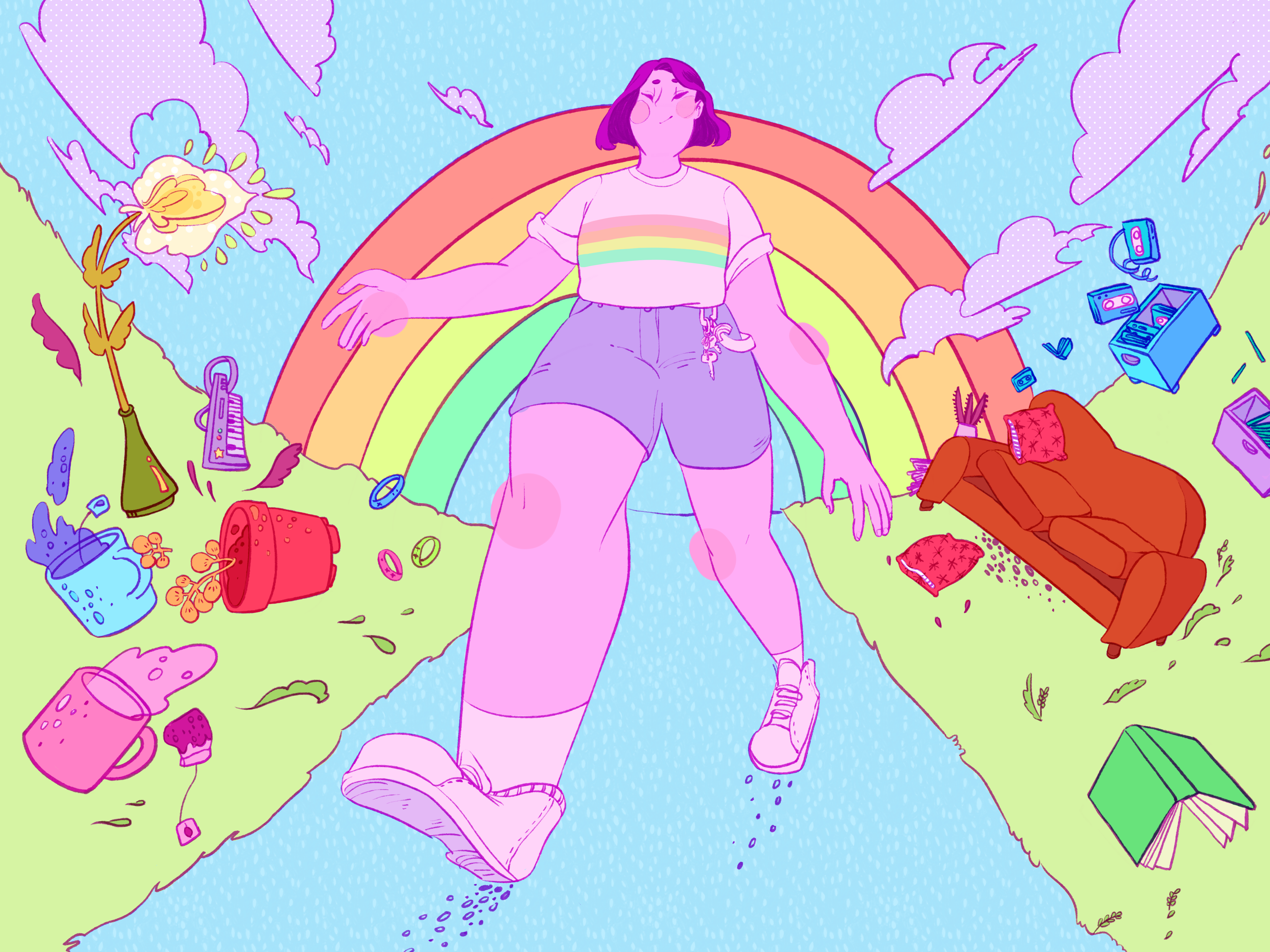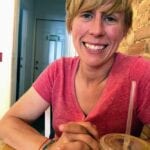“Pretend to be Daniel and kiss me,” my friend Emily whispered.
I wanted to kiss her like she’d asked, but I didn’t want to pretend to be someone else while I did it.
We were 12 years old, laying together in her twin-sized bed during one of our weekly sleepovers. Emily had a raging crush on Daniel, the heartthrob of our Grade 7 class. All of the girls seemed to have a crush on him, falling all over themselves vying for his attention — all except me. While they were busy fawning over Daniel, I was busy crushing on them.
As I lay in Emily’s bed with her whispered request to kiss her reverberating through my ear, a wave of panic washed over me. “I — I have to pee,” I stuttered, and shot up out of her bed.
We didn’t end up kissing. But the moment was an uncomfortable awakening. I began to ask myself questions that led to no answers: Why can’t I get into boys the way my friends do? Why did my heart race when a girl’s hand brushed mine in math class? Why did I want to kiss Emily and not Daniel?
What was wrong with me?
All I really knew beyond a shadow of a doubt was that I was different — and that I could tell absolutely no one.
By the time I reached middle school, the only time I had ever heard anyone utter the word “gay” was with vitriol. At that point, I had never even heard the word “lesbian.”
“All I really knew beyond a shadow of a doubt was that I was different — and that I could tell absolutely no one.”
I spent my formative years in a small town in central Pennsylvania — the kind of place where there are as many bars as there are churches, but little else besides. The population was homogeneous: white, Christian and exclusionary to anyone who didn’t fit that mould. It was the kind of insular town where most people were born and died without having seen the rest of the country, much less the world.
The only exposure I had to people outside of this tiny, intensely conservative bubble was through television and books, which I escaped into frequently, hungry for more of the world than I had seen. Because I grew up in the ’80s and ’90s, before Google was a “thing,” I had nowhere to turn with my quest for answers about why I felt so different from those around me. As a young teenager, I struggled mightily with my feelings for girls, aching to be understood by someone, and like many other queer kids growing up in rural towns, I felt desperately alone in my queerness. Everywhere I went, I searched fruitlessly for even a hint that someone else was like me.
For my 15th birthday, I was gifted Ellen DeGeneres’ book My Point . . . And I Do Have One. As I stared at Ellen’s face adorning the cover, I felt connected to her somehow. I would later learn that that feeling was my first foray into using my “gaydar.” But at the time, all I knew was that I felt an inexplicable kinship with Ellen.
“Everywhere I went, I searched fruitlessly for even a hint that someone else was like me.”
While my mom and sister went dress shopping later that day, I sat for hours in our family minivan in the mall parking lot, drinking in every word Ellen wrote. It wasn’t so much that I thought she was funny, although she is, but more that I liked the warmth that washed over me every time I’d look at her face on the cover. I read the book three more times that week before I tucked it away into my closet —the irony! —and forgot all about it.
A couple of years later in April 1997, “The Puppy Episode” of the television sitcom Ellen aired: the one in which DeGeneres’ character, Ellen Morgan, came out as gay.
In the episode, Ellen is drawn to her date’s co-worker instead of him, and lamented to her therapist — played by Oprah Winfrey — that she’d only ever truly “clicked” with one person.
“What was his name?” the therapist asked.
“For just one brief moment, the weight of the secret I’d been carrying suddenly fell off my shoulders.”
“Susan,” Ellen responded. With that revelation, Ellen raced to the airport to catch Susan before the other woman left town. When she finds Susan, Ellen and the truth come out, while accidentally leaning into a microphone and effectively broadcasting her secret to everyone: “Susan, I’m gay.”
With the eyes of more than 42 million viewers on Ellen that day — my family members and I among them — I was grateful that no one was watching me. My cheeks flushed crimson red and my eyes filled with tears. For just one brief moment, the weight of the secret I’d been carrying suddenly fell off my shoulders.
When the episode ended, I ran upstairs to my bedroom to cry. It was a physical release of all I’d been holding in for years. Tears of relief: I’m not alone. Tears of joy: a gay person like me is on TV. Tears of trepidation: How will I ever find the courage to tell anyone my secret?
“Less than a week after the episode aired, I came out to my five closest friends.”
Watching Ellen — both the character and actress — come out in such a brave, public way helped me find the courage I needed to live my truth. I felt emboldened, forever changed by a single episode of a television show. Less than a week after the episode aired, I came out to my five closest friends.In the hallway between classes the next day, I passed them individual letters telling them that I am gay. The night before, I had painstakingly spent hours writing these letters, and in that moment I felt my heart beating out of my chest. Would they be disgusted? Would they reject me? Would I have any friends left after this?
All of my worries were for naught. My coming out letters were received warmly by three of my friends and encouraged the other two to come out to me, too. Although we kept it a secret from anyone who wasn’t in our circle of friends — we all knew that my homosexuality wouldn’t be as well-received by the sea of homophobes among us at our school — it was a moment of warmth and affirmation for me.
“Knowing there were others like me allowed my confidence to soar.”
While coming out to my parents many months later didn’t go over as well as I’d hoped, they came to accept me once they realized my queerness wasn’t just a phase and that I’d live out of the closet with or without their support.
For a queer kid who had always been taught that being straight is the only way of life, knowing there were others like me allowed my confidence to soar. I carried myself differently, more self-assured and hopeful about my future and place in the world. Even my face, once adorned with acne from the stress of carrying my secret inside of me, began to clear up.
Before the episode aired, I had felt all alone in the world, like there was something inherently wrong with me that I could never reveal to anyone. But when Ellen came out, I had someone to look up to — someone to show me that I wasn’t alone in my queerness. Someone to give me hope that I could one day have a partner and happy life, too.
Thanks in part to the courage I’d gained in watching Ellen come out, I decided to be completely out when I went to university. Living my truth in a new school, away from my small town and without a cloak of secrecy, was freeing and empowering. It wasn’t long before I was making other queer friends and kissing girls who didn’t want me to pretend to be a guy while I did it.
“For the first time in my life, I felt connected to others because of my identity and not in spite of it.”
Prior to coming out, I couldn’t imagine life outside of my sheltered small town. But a little over a year later, I fell in love with a Canadian woman and moved to Montreal to build my life — not just in a new town, but an entirely different country.
It’s something I wouldn’t have done if I hadn’t had the inspiration and motivation to come out when I did.
It wasn’t just because I saw myself in Ellen, but because I felt like I belonged to a wider community. For the first time in my life, I felt connected to others because of my identity and not in spite of it.
More than 20 years later, “The Puppy Episode” is heralded as the moment that helped pave the way for a more queer-inclusive era of television. Seeing ourselves reflected positively in the mainstream media can completely transform — and even save — a queer kid’s life, just like Ellen did mine, all those years ago.



 Why you can trust Xtra
Why you can trust Xtra


